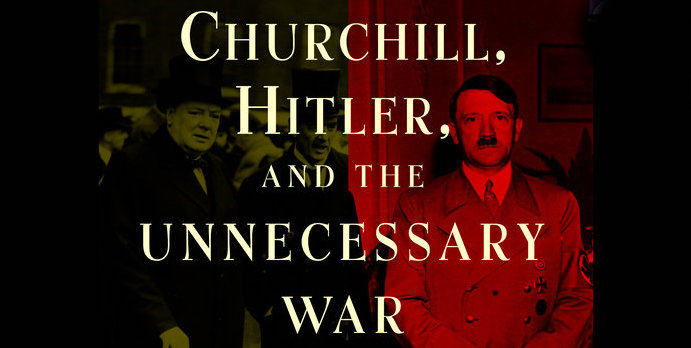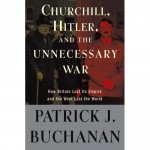
Pat Buchanan and the Art of the Selective Quote
Q: Response to Buchanan?
Was there any pushback to the Pat Buchanan book, Churchill, Hitler and the “Unnecessary War” (2009)? It questioned Churchill’s judgment over his whole life, but particularly his decision to fight on in 1940. I’m sure there has been, but could you give me a citation? —W.M.
 A: Here’s one….
A: Here’s one….
On publication of the book in 2009 I wrote an editorial, which I reprise below.
Churchill, Hitler and the Unnecessary War: How Britain Lost Its Empire and the West Lost the World, by Patrick J. Buchanan. New York, Crown, 518 pp.
No animus toward the author: I have respect for Pat and even voted for him in a New Hampshire Primary. I helped him with a few items during his research (while lampooning his beliefs in friendly banter). “I like a man who grins when he fights,” as Churchill said.
But a problem with Pat Buchanan’s book is the rampant use of selective quotes. Partial quotations edited to distort reality, or to fit a predetermined conclusion, are out of bounds.
Lusting after Armageddon
To establish Churchill’s “lust” for the First World War, for example, Buchanan quotes him on 28 July 1914: “Everything tends towards catastrophe & collapse. I am interested, geared up and happy. Is it not horrible to be built like that?…” (28)
But he omits the rest of that passage: “…The preparations have a hideous fascination for me. I pray to God to forgive me for such fearful moods of levity. Yet I w[oul]d do my best for peace, and nothing w[oul]d induce me wrongfully to strike the blow.” (from Martin Gilbert, editor, The Churchill Documents, vol. 3, 1989.
As the war continues on 10 January 1915, Buchanan has Churchill exclaiming: “My God! This, this is living History. Everything we are doing and saying is thrilling—it will be read by a thousand generations, think of that! Why I would not be out of this glorious delicious war for anything the world could give me (eyes glowing but with a slight anxiety lest the word ‘delicious’ should jar on me).” (66)
The latter is pure hearsay from the notoriously waspish Margot Asquith—but let’s assume he said it. To suit his thesis, Pat trims the rest of what Margot reported: “…I say, don’t repeat that I said the word ‘delicious’—you know what I mean…..” (The Churchill Documents, vol. 6, 400.
Possessed of the words Buchanan deleted, one might ask what Churchill meant by “you know what I mean”? Did he assume Margot knew he realized what barbarity war was—that he had been warning of the apocalyptic nature of a European war since 1903?
“Vile & wicked folly & barbarism”
I searched in vain among Pat’s collection of lusty war quotes for contrary expressions by Churchill—and there are many. Take his 1909 remark after watching German Army maneuvers: “Much as war attracts me & fascinates my mind with its tremendous situations—I feel more deeply every year—& can measure the feeling here in the midst of arms—what vile & wicked folly & barbarism it all is.” (The Churchill Documents, vol. 4, 912.)
Buchanan does include an early 1900s remark about the dangers of a European war, but only to imply that Churchill had changed his tune by 1914. Nowhere do we read exculpatory evidence. Nothing is here on Churchill’s 1911 proposal for an Anglo-German “naval holiday,” for example. Or his plea, at the eleventh hour, for a peace conference attended by all the Heads of State of Europe.
Hitler red herrings
Then there is Hitler, on whom Pat is industrious. Under Hitler’s photo we read: “‘If our country were defeated, I hope we should find a champion as indomitable to restore our courage and lead us back to our place among the nations.’ —Churchill on Hitler, 1937.”
This sentence has often been culled out of context to be misunderstood by the foolish or the unwary. Here is the full passage (Churchill, Step by Step, 1947 edition, 158). Draw your own conclusions:
To feel deep concern about the armed power of Germany is in no way derogatory to Germany. On the contrary, it is a tribute to the wonderful and terrible strength which Germany exerted in the Great War, when almost single-handed she fought nearly all the world and nearly beat them. Naturally, when a people who have shown such magnificent military qualities are arming night and day, its neighbours, who bear the scars of previous conflicts, must be anxious and ought to be vigilant. One may dislike Hitler’s system and yet admire his patriotic achievement. If our country were defeated I hope we should find a champion as indomitable to restore our courage and lead us back to our place among the nations. I have on more than one occasion made my appeal in public that the Führer of Germany should now become the Hitler of peace.
A different light falls on Churchill’s attitude when that was first written (in 1935, as he footnotes in Great Contemporaries). There was still hope then, he thought. All of which shows yet again that you can use Churchill’s words, vacuumed like a gigantic Hoover and offered unabridged by the faithful Martin Gilbert, to prove anything. You only have to pre-select and edit the ones that make your point, however misinformed.
 A: Here’s one….
A: Here’s one….






One thought on “Pat Buchanan and the Art of the Selective Quote”
In this sense of using selective quotations, Buchanan was woke well before woke was a thing and it would be hypocritical of him to criticize the NYT or WP. Thank you for pointing out the intellectual failures behind the book. Buchanan took the lazy path rather than looking at Churchill from 360 degrees and making his case. By misleadingly reporting only what supports his case not only undermines Buchanan’s thesis but his credibility in general. As a conservative myself, I find Buchanan’s actions pointless and tragic.
Comments are closed.